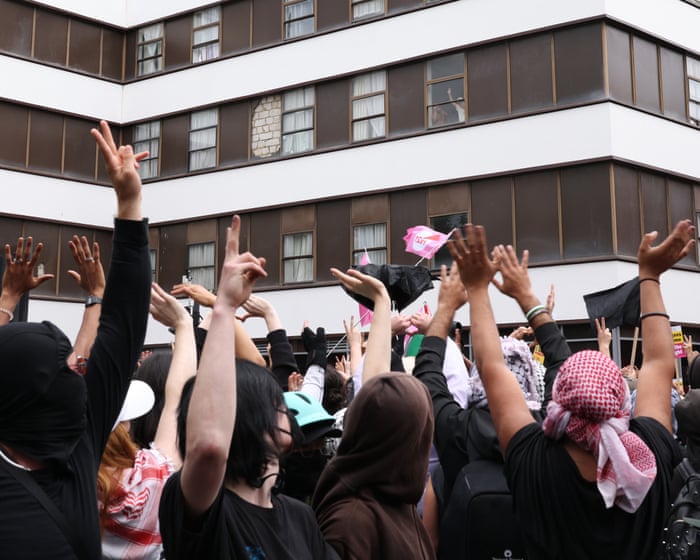According to Home Office data, the number of asylum seekers staying in hotels has increased by 8% over the past year, reaching 32,059. The data also shows that the government is processing asylum applications more quickly, with 71,000 cases—involving 91,000 people—still awaiting a decision. This is a significant drop from 134,000 cases two years ago.
These figures come as local councils increasingly seek to block the use of hotels for housing asylum seekers through legal action. This follows a court ruling that more than 100 asylum seekers staying at a hotel in Essex must be removed. The high court decision has led ministers to prepare for further legal challenges across the country and increased pressure on the government to find alternative housing solutions.
The latest Home Office statistics, released on Thursday as part of regular quarterly immigration updates, cover the first year of the Labour government. As of the end of June, there were 32,059 asylum seekers in UK hotels, up from 29,585 a year earlier under the Conservatives, but slightly down from 32,345 at the end of March. The current number remains well below the peak of 56,042 recorded in September 2023 under the previous government.
For the first time in four years, the backlog of asylum applications has fallen below 100,000 people. It now stands at just over 70,000 cases, involving nearly 91,000 individuals—an 18% decrease from a year ago and the lowest level since September 2021.
In the year ending June 2025, the Home Office forcibly removed 9,100 people, a 25% increase from the previous year. More than half of those removed were foreign national offenders deported after serving prison sentences.
Enver Solomon, CEO of the Refugee Council, praised the progress, saying, “Bringing the asylum system back from the brink of collapse is a genuine achievement in the government’s first year. The increase in asylum decisions means refugees can begin to rebuild their lives sooner, and the use of costly hotels can be ended faster.”
Home Secretary Yvette Cooper highlighted the government’s actions, stating, “The steps we’ve taken—increasing returns of failed asylum seekers by over 30%, cutting asylum costs by 11%, reducing the backlog by 18%, and our upcoming plans to reform the failing asylum appeal system—are crucial to restoring order and ending the chaotic use of asylum hotels we inherited.”
On Tuesday, the Conservative-run Epping Forest council secured a temporary high court injunction to remove asylum seekers from the Bell Hotel. About 140 people must leave by September 12. Labour-run councils in Wirral and Tamworth are among more than 10 reportedly considering similar legal challenges to close asylum hotels in their areas.
Chris Philp, the shadow home secretary, named three Conservative councils—Broxbourne, Reigate and Banstead, and Hillingdon—that are also exploring legal action to shut down asylum hotels in their regions. He noted that many councils are reviewing their options following the Epping ruling.
Whitehall sources indicate the government is expected to appeal the Epping decision. Labour peer Charles Falconer, a former justice secretary, urged ministers to appeal, warning that the ruling creates uncertainty by suggesting some asylum hotels can be closed without specifying which ones. He called for clarity through an appeal.He said the discussion should focus on three things: first, which hostels should remain open and which should not; second, what a reasonable timeline would be for making these decisions; and third, whether protests outside the hostels make it more likely they will be closed.
The Democratic Unionist Party (DUP) is also pushing to remove asylum seekers from hotels in Northern Ireland, following a landmark court ruling in England. Antrim & Newtownabbey Borough Council has started an enforcement investigation into the use of the Chimney Corner Hotel in Mallusk to house asylum seekers, after a complaint from DUP assembly member Trevor Clarke.
Clarke said the party—the second largest in Northern Ireland—would also file complaints about two other hotels housing asylum seekers in different council areas. He pointed to a recent High Court ruling that the Bell Hotel in Essex could not be used for asylum accommodation due to a breach of planning rules, which he believes opens the door for similar legal challenges.
He stated, “Using hotels to house asylum seekers without first obtaining a ‘change of use’ approval through the proper planning process—from hotel to hostel or immigration accommodation—breaks planning regulations. No one is above the law, including government departments. If the Home Office or its contractors want to place large numbers of asylum seekers in our communities, they must follow the same planning rules as everyone else.”
According to the Irish News, the other hotels housing asylum seekers in Northern Ireland are located in the Causeway Coast and Glens, and the Ards and North Down council areas.
Government figures show that Home Office spending on asylum in the UK was £4.76 billion in 2024–25, down 12% from a record £5.38 billion the previous year. This total covers all asylum-related costs, including direct financial support, accommodation, staffing, and other migration and border activities.
Asylum seekers and their families may be placed in temporary accommodation, known as contingency accommodation, if they are waiting for their claim to be processed or if their claim has been approved but longer-term housing is not available. When housing is insufficient, the Home Office—which has a legal duty to provide shelter to asylum seekers who would otherwise be destitute—may use alternatives such as hotels or larger sites like former military bases.
Frequently Asked Questions
Of course Here is a list of FAQs about the reported 8 annual increase in asylum seekers accommodated in hotels with clear and direct answers
BeginnerLevel Questions
1 What does this headline actually mean
It means that over the past year the number of people seeking asylum in the UK who are being housed in hotels has gone up by 8
2 Why are asylum seekers being put in hotels in the first place
The Home Office uses hotels as temporary emergency accommodation when its standard housing is full This is a legal requirement to provide shelter for asylum seekers while their claims are being processed
3 Is using hotels a new thing
No its been used for years but the practice has grown significantly recently due to a large increase in asylum applications and a backlog in processing them
4 Who pays for the hotel rooms
The cost is covered by the UK government meaning it is funded by taxpayers
IntermediateLevel Questions
5 What are the main problems with using hotels for this purpose
There are several common problems
High Cost Hotels are much more expensive per person than other forms of accommodation
Isolation People in hotels often have little space limited cooking facilities and can feel cut off from communities
Local Impact There can be strain on local services and some residents and businesses near the hotels have raised concerns
Wellbeing Long stays in temporary hotel accommodation with little to do can be bad for the mental health of asylum seekers
6 Whats the alternative to using hotels
The preferred alternative is a dispersal system where asylum seekers are housed in more permanent selfcontained properties across the UK This is more costeffective and better for integration
7 Why cant the government just use the alternative
The system is under immense pressure The number of people arriving has outpaced the available housing stock There is also often local opposition to new dispersal accommodation being set up
8 Does this 8 increase mean 8 more people are seeking asylum
Not necessarily The increase in hotel use is a result of the



